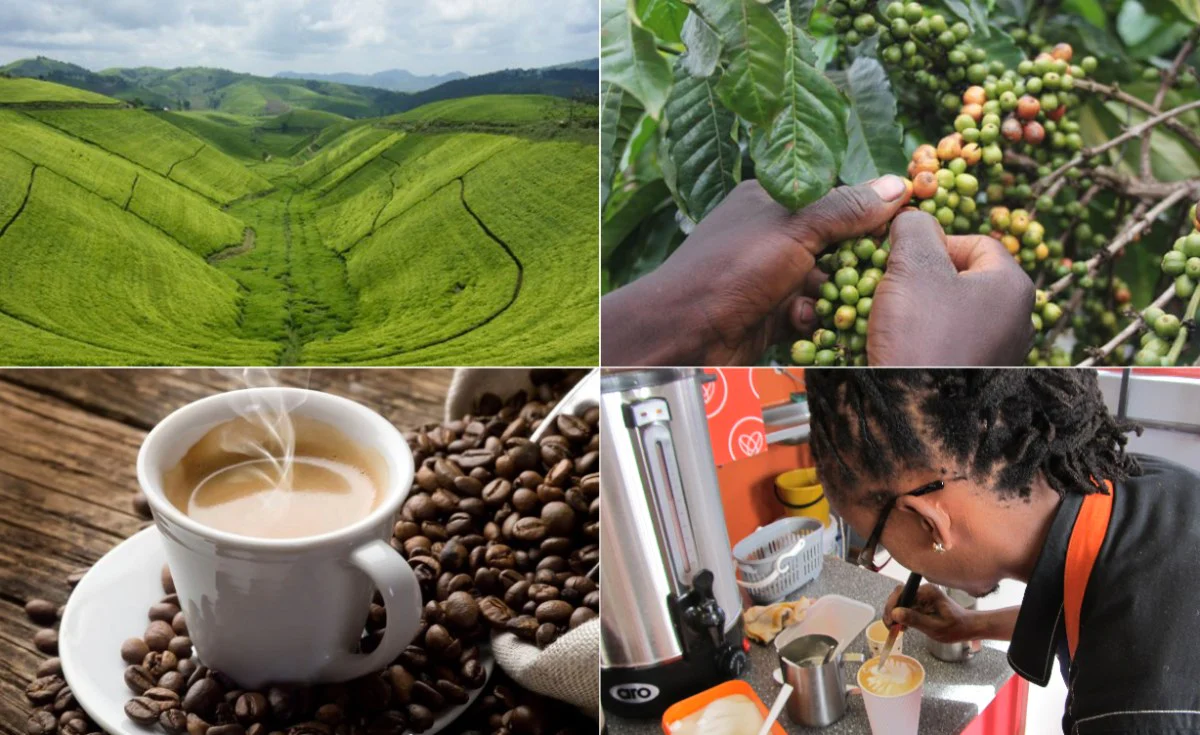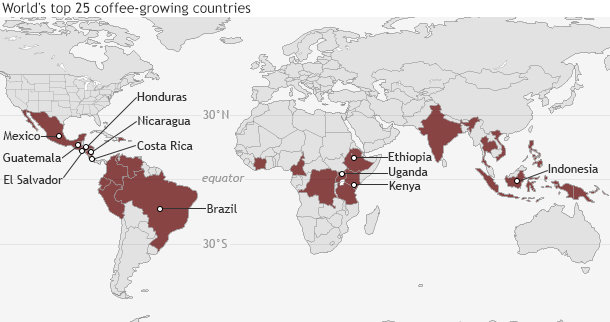Coffee farming is not just about growing beans; it’s about cultivating a sustainable future for both the environment and the community. In this article, we will explore the world of sustainable coffee farming practices, the benefits they bring, and the challenges faced by farmers. From farm management to building resilient landscapes, we will delve into the various aspects of sustainable coffee production, including shade-grown coffee, agroforestry, organic farming, water management, soil conservation, biodiversity preservation, fair trade partnerships, and more. Let’s discover how sustainable coffee farming can protect the planet and enhance the quality of your morning brew.
Key Takeaways:
- Sustainable coffee farming benefits the planet and improves coffee quality.
- Farm management, building resilient communities, and addressing systemic challenges are essential for sustainable coffee farming.
- Practices such as shade-grown coffee, agroforestry, organic farming, water management, soil conservation, and biodiversity preservation are key to sustainable coffee farming.
Sustainable Coffee Farming Practices
Sustainable Coffee Farming Practices involve environmentally conscious methods that aim to reduce the ecological footprint of coffee cultivation while ensuring the long-term viability of the industry.
These sustainable practices encompass a range of strategies such as shade-grown cultivation, natural pest management, and water conservation techniques.
By integrating agroforestry principles into coffee farming, farmers plant trees alongside coffee plants, promoting biodiversity, soil health, and carbon sequestration.
The adoption of organic farming practices eliminates the use of synthetic pesticides and fertilizers, contributing to healthier ecosystems and better coffee quality.
Initiatives like Fair Trade certification and Rainforest Alliance standards encourage sustainable coffee production, give the power toing farmers and ensuring equitable practices in the supply chain.
Introduction to Sustainable Coffee Farming
Introduction to Sustainable Coffee Farming provides an overview of the shift towards environmentally friendly techniques in coffee production, emphasizing the importance of sustainable practices for the well-being of farmers and communities.
The evolution of sustainable coffee farming practices has been a response to the environmental challenges faced by traditional coffee cultivation.
Tree planting plays a pivotal role in enhancing biodiversity and improving soil fertility in coffee-growing regions. This shift from conventional to sustainable farming methods has not only benefited the environment but has also had a positive impact on the livelihoods of coffee farmers and the surrounding local communities. Community support is a crucial element in promoting and sustaining these environmentally friendly approaches in coffee production.
Benefits of Sustainable Coffee Farming
The Benefits of Sustainable Coffee Farming extend beyond quality coffee production to encompass improved ecosystem health, heightened social responsibility, and the promotion of shade-grown coffee varieties.
By adopting sustainable practices, coffee farmers not only produce high-quality coffee beans but also contribute to the preservation of biodiversity and the mitigation of environmental degradation. Through sustainable coffee farming, communities can establish sustainable livelihood opportunities that uplift the local economy while ensuring fair wages for workers.
- Embracing social responsibility in coffee production involves ethical labor practices, transparency in the supply chain, and support for small-scale farmers.
- Shade-grown coffee methods help maintain ecosystem balance by providing habitats for diverse wildlife species, preventing soil erosion, and reducing the need for chemical inputs, thus fostering long-term sustainability.
Challenges in Sustainable Coffee Farming
Despite its benefits, Sustainable Coffee Farming faces challenges related to maintaining soil fertility, optimizing nutrient efficiency, and implementing climate-smart agricultural practices.
One major obstacle in sustainable coffee farming is soil degradation, which occurs due to intensive cultivation practices. This leads to a decrease in organic matter content and soil structure, negatively impacting crop productivity. Nutrient depletion poses a significant challenge, as coffee plants require a delicate balance of essential nutrients for healthy growth.
Adapting to changing climatic conditions is another critical issue faced by coffee farmers. Unpredictable weather patterns, including droughts, floods, and temperature fluctuations, can disrupt crop yields and quality. To address these challenges, adopting climate-smart agriculture techniques is crucial.
- Climate-smart agricultural practices, such as agroforestry and cover cropping, can enhance soil health by improving organic matter levels and reducing erosion.
- Implementing precision agriculture technologies aids in optimizing nutrient efficiency, ensuring that plants receive the right amount of nutrients at the right time.
- Long-term sustainability of coffee production can be ensured through the integration of sustainable farming practices, conservation agriculture, and biodiversity preservation.
Farm Management
Effective Farm Management is essential for the success of sustainable coffee farming, give the power toing farmers and communities to adopt Fairtrade practices and uphold ethical standards in coffee production.
One of the key aspects of farm management in sustainable coffee farming is ensuring that Fairtrade International guidelines are followed to guarantee fair prices for smallholder coffee farmers. Fair prices help these farmers secure a stable income, reinvest in their farms, and improve their livelihoods.
Sustainable practices such as shade-grown coffee, water conservation, and soil management play a vital role in preserving biodiversity, promoting ecosystem health, and mitigating climate change impacts within coffee farming landscapes.
Building Resilient Communities and Landscapes
Building Resilient Communities and Landscapes in the realm of coffee farming involves addressing environmental risks, fostering cooperation among coffee farming communities, and integrating shade trees for enhanced sustainability.
One of the key strategies in creating resilience within coffee farming communities is risk mitigation. This entails implementing measures to minimize the impact of climate change, pests, and diseases. Coffee cooperatives play a vital role in this regard by pooling resources and knowledge to collectively tackle challenges. Governmental support through policies that promote sustainable practices and provide financial assistance can significantly boost the resilience of coffee farmers. Environmental stewardship, such as maintaining biodiversity through the planting of diverse shade trees, is crucial in ensuring the long-term viability of coffee production systems.
Addressing Wider Systemic Challenges
Addressing Wider Systemic Challenges in sustainable coffee farming involves seizing market opportunities, fostering economic sustainability, and prioritizing biodiversity conservation through initiatives like Pur Projet.
One of the key aspects in promoting sustainable coffee farming is the recognition of the economic constraints faced by coffee farmers. Market fluctuations, volatile pricing, and production costs all contribute to the financial instability of these communities.
Maintaining a balance between economic viability and environmental stewardship is crucial for the long-term success of coffee farming. Organizations like Pur Projet play a vital role in this landscape by providing support for innovative agroforestry models that not only enhance carbon sequestration but also promote economic give the power toment for the coffee-growing communities.
Shade-Grown Coffee
Shade-Grown Coffee cultivation exemplifies sustainable practices that protect wildlife habitats, promote soil fertility, and support biodiversity conservation, with organizations like TechnoServe playing a pivotal role in its implementation.
One of the significant benefits of shade-grown coffee production is its positive impact on wildlife conservation. By preserving the natural shade provided by trees in the coffee plantations, a diverse ecosystem is maintained, creating a conducive environment for various bird species, insects, and animals to thrive. This sustainable farming method not only safeguards the habitats of these creatures but also enhances the overall biodiversity of the region.
Agroforestry
Agroforestry integrates native trees into coffee farms to enhance biodiversity, reduce soil erosion, and create sustainable landscapes, with regions like Caldas in Colombia exemplifying successful agroforestry models.
In agroforestry systems, the strategic planting of native trees alongside coffee plants plays a key role in fostering a balanced ecosystem. These trees provide shade, which helps regulate the temperature and humidity levels, creating a favorable microclimate for coffee growth. Their deep roots help prevent soil erosion by holding the soil together, ensuring its fertility and stability. The presence of diverse tree species promotes a healthier environment, attracting beneficial insects and birds that contribute to natural pest control.
Organic Farming
Organic Farming practices prioritize soil health, natural pest control, and environmental sustainability in coffee cultivation, with regions like Jardín in Colombia showcasing the benefits of organic farming.
Soil conservation lies at the core of organic farming. By avoiding chemical fertilizers and pesticides, organic farms focus on nurturing the soil through techniques like composting, crop rotation, and mulching. This approach helps maintain soil structure, fertility, and biodiversity, which in turn supports healthier plant growth.
In terms of pest management, organic farmers employ techniques such as companion planting, natural predators, and organic sprays to control pests without harming the environment. These methods not only reduce the ecological impact but also contribute to a balanced ecosystem.
Water Management
Water Management practices in coffee processing play a crucial role in preventing water pollution, ensuring fair wages for workers, and promoting sustainable water conservation efforts within coffee farming communities.
Water pollution is a major concern in the coffee industry, as improper disposal of wastewater from processing plants can contaminate local water sources and harm ecosystems. By implementing sustainable water conservation practices such as recycling water and using eco-friendly treatment methods, coffee farmers can mitigate these environmental impacts.
Ensuring fair wages for workers is essential to the overall well-being of coffee-producing communities, fostering economic stability and improving living standards. Ethical water management strategies not only benefit the environment but also promote long-term profitability and resilience in the coffee supply chain.
Soil Conservation
Soil Conservation initiatives focus on carbon sequestration, erosion reduction, and soil enrichment to promote the long-term sustainability of coffee farming, with programs like the AAA Sustainable Quality™ Program leading the way in implementing effective conservation practices.
Carbon sequestration, a process essential for regulating the Earth’s climate, involves capturing and storing atmospheric carbon dioxide to mitigate global warming. In coffee farming, this translates to planting trees and adopting agroforestry practices to absorb carbon and enrich the soil.
Erosion control techniques, such as contour plowing and cover cropping, help prevent soil degradation and loss, preserving the fertile land for future crops.
The AAA Sustainable Quality™ Program plays a pivotal role in educating farmers about these practices, emphasizing their impact on the overall health and productivity of coffee plantations.
Biodiversity Preservation
Biodiversity Preservation efforts in coffee farming focus on creating wildlife corridors, enhancing natural pest control methods, and supporting biodiversity conservation, with organizations like Fairtrade International championing these initiatives.
The creation of wildlife corridors plays a crucial role in promoting the uninterrupted flow of plant and animal species within coffee plantations, thereby fostering diverse ecosystems. By facilitating the movement of wildlife, these corridors help pollinators reach crops more efficiently, enhancing coffee bean production. Natural pest control methods, such as deploying predatory insects or birds, aid in managing pests without the need for harmful chemicals, preserving the delicate balance of the ecosystem. Through these practices, biodiversity-friendly coffee farming not only ensures sustainable harvests but also safeguards the fragile habitats where various species thrive.
Fair Trade and Ethical Partnerships
Fair Trade and Ethical Partnerships play a pivotal role in ensuring fair prices for coffee farmers, fostering community support, and driving sustainable practices, with initiatives like the AAA Farmer Future Program give the power toing smallholder farmers.
By providing a structured framework, Fair Trade agreements ensure that farmers receive a fair share of the profits, directly impacting their livelihoods. Ethical partnerships further strengthen this foundation by emphasizing transparency and accountability throughout the supply chain, safeguarding the rights and well-being of coffee producers.
Programs like the AAA Farmer Future Program go beyond monetary transactions, enabling farmers to access resources, education, and tools to enhance their farming techniques and diversify their income streams. This holistic approach not only promotes economic sustainability but also fosters social development within coffee-producing communities, creating a ripple effect of positive change.
Conclusion
Sustainable Coffee Farming Practices offer a pathway to economic sustainability, environmental stewardship, and market opportunities in a circular economy, with industry leaders like Nespresso spearheading initiatives for a more sustainable coffee sector.
One of the key aspects of sustainable coffee farming is its potential for economic growth. By implementing practices that ensure fair wages for farmers, efficient resource management, and quality control, the coffee industry can thrive economically. This not only benefits the farmers directly involved but also contributes to the overall economic development of regions where coffee is a major commodity.
Sustainable coffee farming plays a crucial role in environmental conservation. Through practices such as shade-grown coffee cultivation, biodiversity preservation, and soil conservation, coffee farms can protect natural ecosystems and minimize their carbon footprint.
Embracing circular economy principles in the coffee industry can lead to a more sustainable production and consumption cycle. This involves reducing waste, promoting recycling, and reusing by-products to create a closed-loop system that minimizes environmental impact.
Market opportunities also play a significant role in driving sustainable consumption within the coffee sector. Companies like Nespresso are actively investing in sustainable sourcing practices, carbon neutrality initiatives, and ethical supply chains, setting an example for the entire industry.
Frequently Asked Questions
What is sustainable coffee farming?
Sustainable coffee farming is a method of growing coffee that prioritizes environmental and social responsibility, while also producing high-quality coffee beans. This means using practices that reduce the impact on the planet and support the well-being of workers and local communities.
How does sustainable coffee farming protect the planet?
Sustainable coffee farming protects the planet by using methods that conserve natural resources, reduce pollution, and promote biodiversity. This includes practices such as agroforestry, composting, and water conservation techniques.
What are some common sustainable farming practices used in coffee production?
Some common sustainable farming practices used in coffee production include shade-grown cultivation, crop rotation, and integrated pest management. These methods help to maintain soil health, protect against erosion, and reduce the need for harmful chemicals.
Why is sustainable coffee farming important?
Sustainable coffee farming is important because it helps to mitigate the negative impacts of conventional coffee farming on the environment and communities. It also ensures the long-term viability of the coffee industry by promoting sustainable practices that can meet the growing demand for coffee in a responsible way.
Does sustainable coffee farming improve the quality of coffee?
Yes, sustainable coffee farming can improve the quality of coffee. By using methods that protect the health of the soil and promote biodiversity, coffee plants are able to produce higher quality beans with more complex and distinct flavors.
How can consumers support sustainable coffee farming?
Consumers can support sustainable coffee farming by purchasing coffee from companies or producers that prioritize sustainability and by looking for certifications such as Fair Trade, Rainforest Alliance, or Organic. Additionally, consumers can educate themselves on sustainable farming practices and support initiatives that promote sustainability in the coffee industry.






